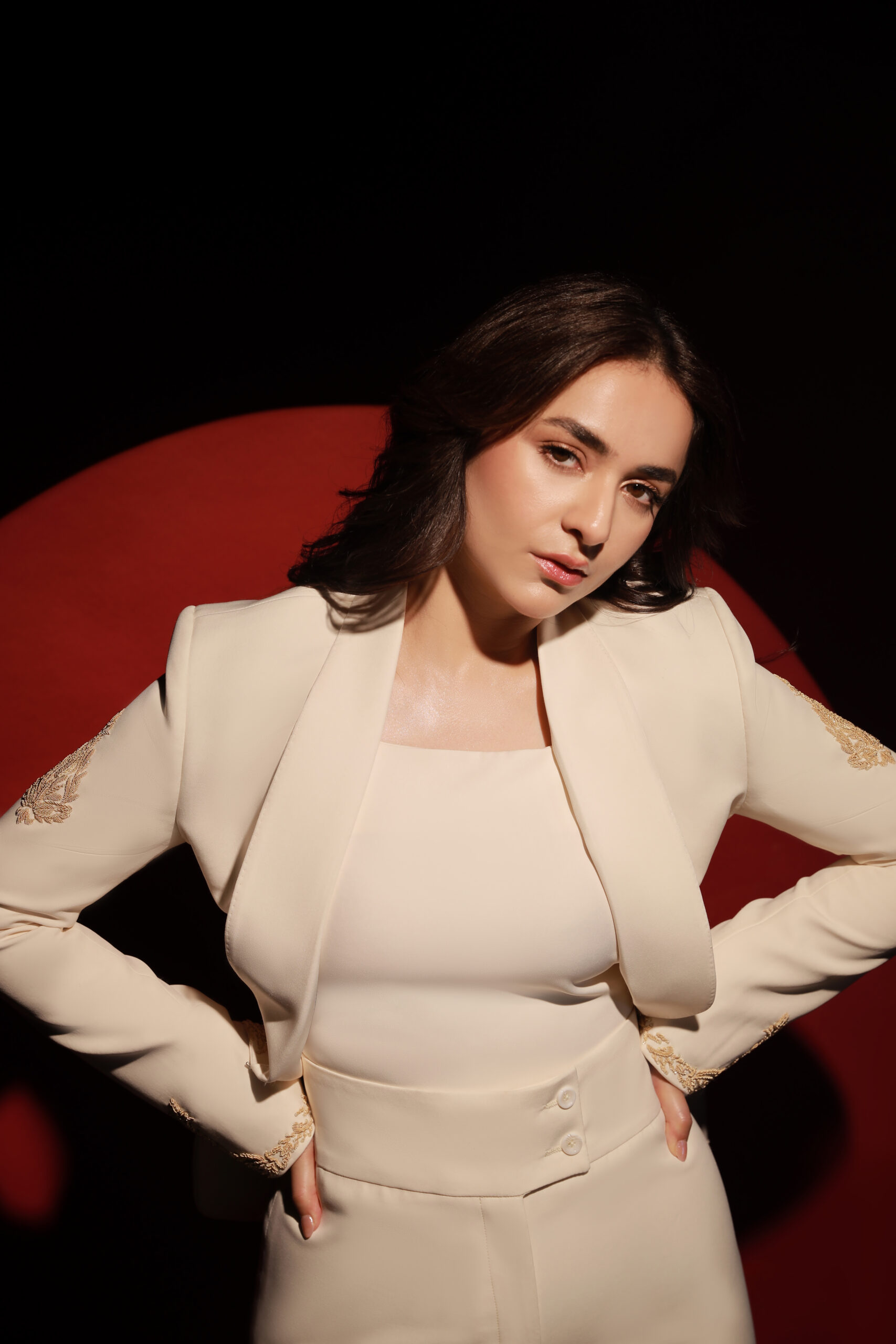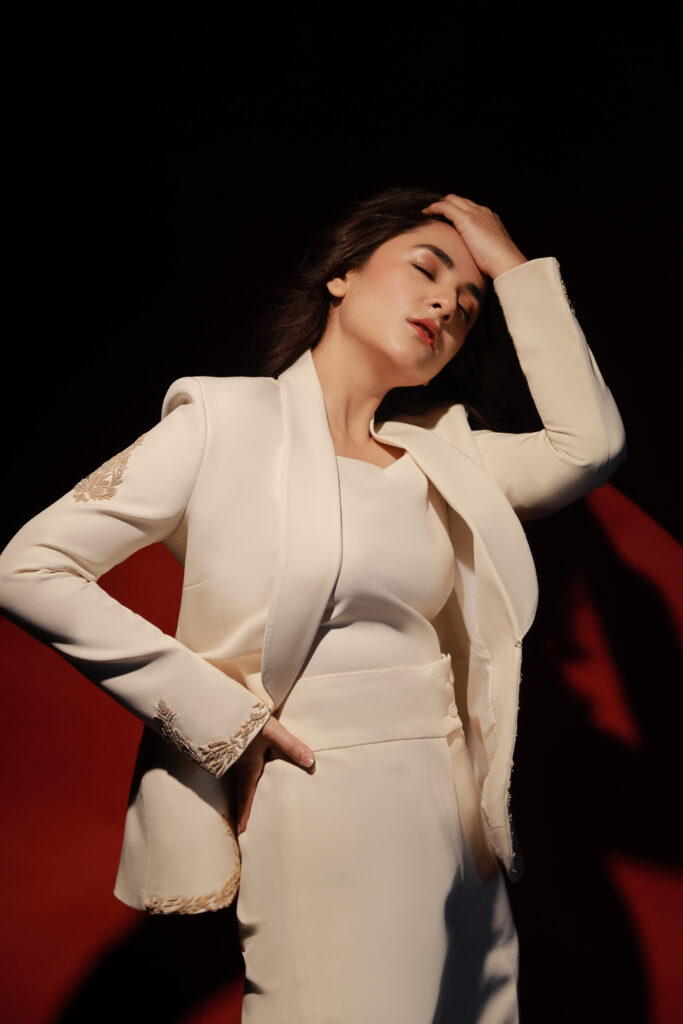Entertainment
A Dynamic Virtuoso: Yumna Zaidi

By Zurain Imam
In a drama-scape riddled with stereotypical roles being assigned to Pakistani TV actresses, supernova talent Yumna Zaidi has strategically and successfully dodged the type-casting bullet by always opting for unconventional and disparate roles buoyed by nuanced performances. The 34-year-old Leo originally from Sahiwal, who is undoubtedly one of the most talented and beloved actresses on television with an almost obsessive fan-following, is stoic about her career choices and evolution which has helped her to carve a distinctive aura that unequivocally sets her apart. Zaidi has indubitably mastered the balancing act between critical and commercial acclaim, garnering both rave reviews; waltzing through the ratings game and mesmerising her fan base. Her devotees habitually upload reels
from her myriad dramas and Zaidi is often a top trend on X (formerly Twitter).
Explains Zaidi about her professional preferences, “If you see my work on television, I have attempted a variety of genres and roles – so much so that I don’t think any other actor, that I know of in this industry, has done that. My present and my past projects are full of multiple storylines. “In recent times her body of work shines with a bevy of disparate roles, including commercial hits inclusive of the hugely popular and record-breaking ‘Tere Bin’ and a slew of critical successes such as the award-winning ‘Bakhtawar’.
“I enjoy challenges and taking risks, “says Zaidi, “It’s when you break the formula by doing things differently that you click with the audience. In the early years of my career, I deliberately didn’t opt for conventional roles. It’s important to develop the audience’s taste to the kind of performances that you can deliver. If I got offered five different scripts, I would often make some of the people who had approached me upset by choosing the least typical role. If I hadn’t done that, I would have run the risk of being typecast. Any time a drama became successful, a number of similar scripts started coming my way. I’ll now keep the same approach for films as well.”
Zaidi made her TV screen debut in 2012 as a supporting character in the domestic-drama Thakan which was followed by lead roles in several television series in the same year including the melodrama Khushi Ek Roag; andthe romantic serial Teri Raah Main Rul Gai. The followingyear in 2013 she made a special appearance in the series Sannata and acted in the family drama Meri Dulari and the revenge play Ullu Baraye Farokht Nahi, the latter earning her recognition and a nomination for Hum Award for Best Supporting Actress. Later in 2014, she played a supporting role in Kashif Nisar’s Kis Se Kahoon and gained further popularity by portraying a troubled wife in Farooq Rind’s tragic-romance Rishtay Kuch Adhooray Se which established her as a leading actress and earned her Hum Award for Best Actress and Best Actress Popular nominations. She continued to garner praise for portraying diverse characters in the jealousy-riddled drama Mausam (2014) and the tragi-comedy Jugnoo (2015) which earned her three Hum awards nominations. In 2015 Zaidi also acted in Guriya; Paras and Aap ki Kaneez which garnered her more Best Actress nominations. Zaidi continued to ride the crest of success with the tragic-romance Guzaarish (2015); Momina Duraid’s romance Zara Yaad Kar (2016); Kashif Nisar’s dark revenge drama Pinjra (2017) and Pukaar (2017).
“I enjoy challenges and taking risks,” says Zaidi. “It’s when you break the formula by doing things differently that you click with the audience. In the early years of my career, I deliberately didn’t opt for conventional roles. It’s important to develop the audience’s taste to the kind of performances that you can deliver.”
In 2017 Yumna Zaidi also starred in Hum TV’s Yeh Raha Dil opposite Ahmed Ali Akbar. Her scintillating on-screen chemistry with Ali Akbar was praised by viewers and earned them a nomination for Best On-screen Couple at the Hum Awards. In the same year she portrayed Sila, a sexual harassment victim in director Momina Duraid’s Dar Si Jaati Hai Sila writtenby Bee Gul and directed by Kashif Nisar. In 2019 she acted in Dil Kiya Karey, directed by Mehreen Jabbar and made a special appearance in Angeline Malik’s anthology series Choti Choti Batain on HumTV. She further rendered an extended cameo in Hum TV’s ground-breaking Ishq Zahe Naseeb.
After establishing herself as a major player Zaidi starred in Inkaar (2019) Pyar Ke Sadqay (2020), Dil Na Umeed To Nahi (2021) Sinf-e-Aahan(2021), Parizaad (2021)and Bakhtawar (2022).
Inkaar (in which she played a brave university student fighting against a flawed judicial system; Piyar Ke Sadkay (in which she portrayed an ingénue social misfit) and Bakhtawar (as the titular gender transforming survivalist Bakhtawar,) each earned her Lux Style Awards for Best Television Actress. (Bakhtawar earned Zaidi both Best Actress Critics and Viewer’s Choice Awards).
Zaidi has the honour of becoming the Lux Style Awards’ most awarded female actor in the Television category with five awards to her credit.
Zaidi has also expanded her repertoire by acting in a slew of diverse telefilms including Momina Duraid’s Subah Be Daagh Hai (2014) directed by Junaid Masood Khan; Shaadi Impossible (2019) directed by Mohsin Talat’ andthe Angeline Malik’ helmed Raja Ki Raji (2020).
But it was the Yumna Zaidi-Wahaj Ali buoyed drama serial Tere Bin which explored the vacillating fairy tale love story between Murtasim and Meerub that became a ground- breaking hit in 2023. Directed by Siraj-ul-Haque, Season One of Tere Bin aired from December 28, 2022 to July 6,2023 and its second season premiered on December 29, 2023, garnering immense popularity.
Which brings us to Yumna Zaidi’s momentous and, dare we say, typically unconventional cinematic debut 12 years after she entered the entertainment industry in director Umair Nasir Ali’s sports film Nayab- in which Zaidi plays the titular role of Nayab, an aspiring cricketer from Karachi who has a passion for the sport but is hesitant due to societal limitations and lack of opportunities. The movie further deals with her brother’s disappointment in not attaining his dreams of being a cricketer and instead supporting his sister’s aspirations, despite their father’s objections.
With a script written by the famed Laal Kabootar duo Ali Abbas Naqvi and Basit Naqvi, the cast includes Javed Sheikh, Usama Khan, Fawad Khan, the theatre actor who has worked in multiple web series including Churails. Nayab was released nationwide on January 26, 2024 and had its international release in cinemas on February 2nd 2024. The film’s international distribution by HUMFilms signalled a global release that transcends geographical boundaries.
Yumna Zaidi has said she was cautious while navigating and shifting from one medium to another but also excited. “I always take on things as a challenge and I am very focused on doing it well. Big screen has its own charm, so when I began shooting Nayab I was nervous and excited at the same time. I was a bit anxious in the beginning but during the promotion of Nayab, my anxiety went away.”
Zaidi had been offered myriad movie roles before Nayab but she had refused them. But she was drawn to Nayab’s strong content which won her heart. “It’s a brilliant story and it is meaningful. I was hooked to Nayab’s script and I just couldn’t let it go to anyone else.”
“From the initial ABCs of cricket to rigorous training sessions, practice matches on the final pitch, it’s been a long process practising for two-and-a-half months on both batting and bowling and I thoroughly enjoyed it all.” In her ongoing commitment to avoid stereotyping Zaidi said she didn’t watch cricket matches before the shoot. “Luckily during my learning sessions, I got to meet some professional women cricketers who really inspired me. I came to know about their lives, and how much they had sacrificed for their dreams and goals.”

Elaborating about her role Zaidi explains that Nayab is a daring girl whose passion for cricket is limitless. Nayab has an unconventional story. It’s about sports, family, relationships, emotions, the support that a girl gets if she wants to pursue a career, by the people around her, her brother, her partner. “In Pakistan, cricket is still essentially viewed as a man’s sport. Becoming a cricketer in our chauvinist society is not an easy task. First of all, it’s not easy for a middle-class girl to get permission from her family, secondly there are no big grounds where girls can play freely and then there is a long and tedious selection process. So, my role in Nayab depicts the struggle of every aspiring young female cricketer.”
After having walked the ramp six years ago in December, 2017 for designer Aisha Farid’s collection Crystalline at HUM Bridal Couture Week, Zaidi has upped her glam quotient and recently undergone a style metamorphosis appearing in uber-luxe and edgy fashion pictorials as well as dressing up glamorously during promotions for Nayab.
Yumna Zaidi is concurrently wrapping up the shoot of the TV drama series
‘Gentleman’ in which for the very first time graces the small screen with Humayun Saeed. This highly anticipated drama directed by Haisam Hussain and written by Khalil-ur-Rehman Qamar is a riveting blend of romance, mystery, and clandestine affairs, delving deep into the lives of two seemingly incompatible individuals whose fates intertwine in a most enigmatic manner.
Did Zaidi have doubts about being paired with the beloved veteran actor?
“We both felt that no other script could have done more justice to us being paired on screen,” Zaidi ripostes. “And now, after having worked with Humayun Saeed, I have become a fan of his. He really puts in 1,000 percent into his acting, and he’s also such a good, humble person.”
After having walked the ramp six years ago in December, 2017 for designer Aisha Farid’s collection ‘Crystalline’ at HUM Bridal Couture Week, Zaidi has upped her glam quotient and recently undergone a style metamorphosis appearing in uber-luxe and edgy fashion pictorials as well as dressing up glamorously during promotions for Nayab.
In conclusion Yumna Zaidi reflects about her success, “I just feel that I have worked very hard to get where I am now and maybe that’s why everything has turned out so well. Sometimes you manifest something and you connect with the universe and, then, the universe gives back to you. I have always manifested the future for myself.
The best part about our life is that no matter what bad happens to us, HE [God] is there silently watching over, and only this thought is so comforting. Be thankful for everything in your life.”
